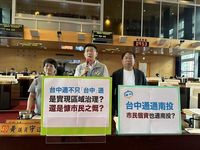On April 25, 2025, during a Finance and Economic Affairs Q&A session at the Taichung City Council, councilors Huang Shou-ta, Hsieh Chih-chung, and Chang Yu-hsiu raised serious concerns regarding the city’s investment in Nantou County through the Taichung Tong platform. They criticized the unclear mechanisms for sharing resources between the two regions, questioning whether Taichung citizens were being unfairly burdened by costs associated with this integration.
The councilors specifically highlighted that 1.68 million Taichung Tong members had allegedly 'agreed' to Nantou County's privacy policy without their knowledge. This revelation raised alarms about the potential control of Taichung citizens' personal data by Nantou authorities. "Is our personal information now at the mercy of Nantou?" Huang Shou-ta asked, emphasizing the need for clarity on privacy rights.
During the session, Huang Shou-ta demonstrated the Taichung Tong app, revealing that it not only contained the 'Taichung City Government Privacy Policy' but also included the 'Nantou County Government Privacy Policy' without obtaining prior consent from users. This situation potentially violates Article 15 of the Personal Data Protection Act, which regulates how public entities collect personal data.
Huang further questioned the timeline of policy implementation, noting that the integration with Nantou County began at the end of December 2024. He argued that the city government should have issued a revised privacy policy and sought consent from existing members before proceeding with the changes. "Who authorized the Nantou County privacy policy? Was it the head of the Digital Development Bureau or the mayor?" he inquired.
The councilors collectively expressed that while cross-domain integration is beneficial, it should not come at the expense of citizens' privacy rights. They urged the Digital Development Bureau to expedite the necessary processes to ensure such incidents do not occur in the future.
In response to the councilors' inquiries, the Digital Bureau clarified that the costs associated with connecting Nantou County to Taichung Tong would be entirely borne by Nantou County. They stated that Taichung City had not allocated any additional funds for this integration. However, Huang Shou-ta pointed out that while Nantou's system development costs amounted to only 500,000 NTD, Taichung City was projected to spend over 30 million NTD in 2025 on system maintenance and expansion, indicating a significant imbalance in financial responsibilities.
"Mayor Lu Shiow-yen has grand ambitions to connect Taichung Tong with other counties like Changhua, Miaoli, and Yunlin, but this will only increase the server load and costs. Why should Taichung citizens foot the bill for these expansions?" Huang criticized, suggesting that the mayor's political aspirations were being funded by the taxpayers of Taichung.
Moreover, Huang raised concerns regarding the collection of personal data, pointing out that the app does not clearly differentiate between the data required from general members and full-function members, particularly in terms of occupational information. This lack of clarity presents potential loopholes in data consent, raising further questions about how seriously the city government takes its responsibility to protect citizens' privacy.
In light of these concerns, the Digital Bureau reassured councilors that they were committed to safeguarding personal data. They explained that Taichung Tong's integration with Nantou's lifestyle information services requires users to apply for a library card from the Nantou County Library to access its system. Additionally, parking fees are managed through a registration system where members input their license plate numbers.
Despite these assurances, the councilors remained skeptical. They emphasized that while the integration of services can enhance efficiency, the protection of citizens' privacy must remain paramount. They called on the Digital Development Bureau to ensure that any future integrations are accompanied by transparent privacy policies and explicit consent from users.
The ongoing debate reflects a broader concern about digital privacy and data management in Taiwan, where citizens are increasingly aware of their rights regarding personal information. As the government pushes for technological integration across regions, the challenge lies in balancing innovation with the fundamental rights of individuals.
As this discussion unfolds, the Taichung City Council's commitment to protecting the privacy of its citizens will be closely scrutinized. The outcome of this situation could set a precedent for how personal data is managed in future governmental initiatives, particularly as more services become interconnected.
In conclusion, the Taichung City Council's concerns highlight the critical need for transparency and accountability in the management of personal data, especially as digital platforms continue to evolve. The implications of this integration extend beyond local governance, touching on the very essence of privacy rights in the digital age.

